Trust is the basis for any relationship. Whether it is between you and your friends, or between one company working with another, even with governments sharing information with each other. Without trust, society cannot exist. Every type of a relationship requires some type of trust that is built through time.
But what is trust? And how does one go about establishing it with another entity? Trust is earned through a give-and-take between parties and demonstrated pattern of reliability. It is also relative, as everyone has a different level of risk appetite. A balance that is relative to the amount of risk the person is willing to take against the amount of reliability the other party has demonstrated in the past.
So how does this balance take place?
Clearly, if no one is willing to share or demonstrate anything about themselves, trust cannot be established. There has to be some level of vulnerability to even begin the initial stages of establishing trust. But at the same time, complete and full transparency also does not help establish trust. And this is because almost all relationships start off mutually distrustful. Trust is something earned. If given to someone arbitrary, that person could use that trust against you.
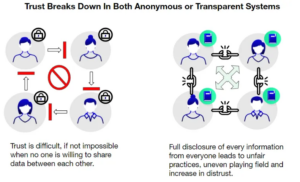
And in a way this balance of privacy and transparency to establish trust has been tipped in favor of one side to another throughout history. How many times have you or someone you know been burned by giving trust to someone who–knowingly or unknowingly–betrayed it? How many deals are broken between companies? How many government secrets have been compromised through leaks? Building trust is a gradual process, where one party shares something in hopes that the other party shares something of equal value.
But what if there was a way to share information without sharing information?
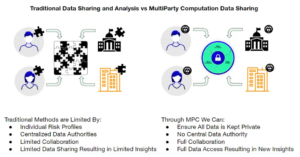
As we reviewed in other articles, multiparty computation allows for the computing of data even if the owner does not share the details around it. And in the example of sharing of data, this means any mutually distrustful parties can collectively allow the use of their data without sharing the details of data itself.
What does this mean in practice? At a high level, this means you can now reduce the weight of risk in the balance of establishing trust. Because you no longer have to expose your private data, the risk of that data being used against you is lowered. And this means you no longer require the same heavy weight for demonstrated reliability that you would need on the other side of the trust scale.
This is a game changer on many levels. Trust is the fundamental basis for any relationships between entities. With MPC, we now have the opportunity to change how this can be played.
In the example below, let’s say we have two financial companies that are competitors. They have a lot of secrets they would like to keep internal, but they do business with each other as a part of their overall practice. As a result of their business, there are many mutual clients. If there was a suspicious activity in one of their clients, having a single set of data they can analyze may not be enough. But what if both companies could share the use of their data together for forensic analysis without sharing the details of the data itself? This may lead to a far more comprehensive analysis.
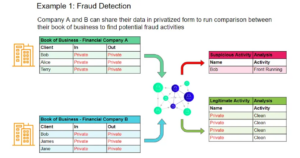
Another example is where multiple companies need to validate meeting of certain regulatory or compliance goals. But to compute the data, it requires exposing private information. Through MPC and Partisia Blockchain, a company will be able to validate meeting regulatory goals without exposing their data to the public.
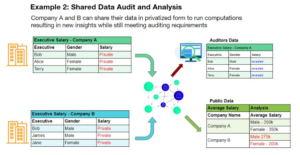
These are very simple examples of how companies can still work together without revealing their private data. And we have quite a variety of projects building on Partisia Blockchain that takes advantage of this new way of doing business.
CyberPeace Institute is working with Partisia Blockchain to help NGOs combat the issue of malware and ransomware by allowing NGOs to privately work with other parties who may be facing similar attacks. This allows NGOs to work together with others without reputation impact or exposing information that may create other vulnerabilities in their system.
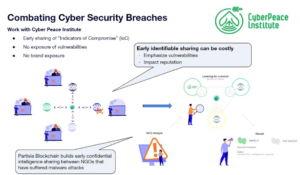
Monadi is working on helping companies comply with CSRD regulations that will impact over 50,000 companies in the EU. By 2025, companies will need to validate that they are meeting certain SDG goals, with the first goal being able to certify that there is no gender pay gap in their executives’ compensations. As the regulation matures, Monadi will be in a good position to help companies certify other SDG requirements without the need for the company to expose private data.
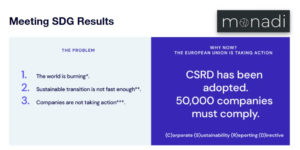
With a growing number of partners and integrators looking to solve the issue of trust, Partisia Blockchain is well positioned to help provide the solutions we need–whether it is to address the transparency in blockchains or to solve existing problems outside the blockchain space.
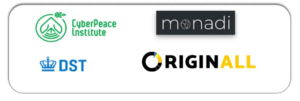
For additional insights on this use case, come and watch our Q&A session we did on this topic.
By creating a programming language that allows for developers to use MPC in a generic way, Partisia Blockchain Foundation has made the creation of applications that can harness the power of MPC for different use cases a possibility. Partisia has been at the forefront of providing private MPC solutions since 2008. And by layering this technology on top of an interoperable and scalable blockchain, Partisia Blockchain is now paving the way for anyone to create solutions that can balance privacy and transparency to build trust.
To learn more about different use cases or partner with us for solutions, please visit partisiablockchain.com, check out our Medium articles, development documentations or email us at build@partisiablockchain.com.
Ledgers are the primary ways settlements are recorded. The first double bookkeeping ledger system was recorded in use as far back as the 1300s. It is still the de-facto system used today to record transactions between entities.
Fast forward to 2008. Satoshi Nakamoto (pseudonym) was frustrated with the corruption due to the lack of transparency and centralized control of the traditional system. He proposed a transparent distributed ledger system that was immutable as a system of recording transactions. Thus Bitcoin was born.
But with all new systems, there is always room for improvements.
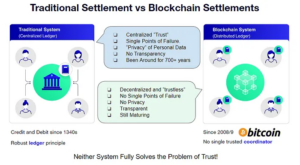
As discussed in our previous articles, full transparency does not solve the problem of building trust. In fact, privacy is a requirement in any trust relationship. For example, nobody would trust a credit card provider that revealed every purchase cardholders made just by someone having their credit card number. In a traditional blockchain space, every transaction is written in a public ledger. It would only require matching a wallet address to a name to see the full history of their transactions.
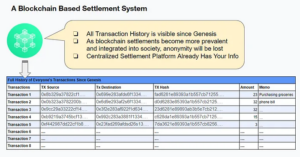
How can you have a blockchain that privatizes transactions and has enough flexibility to analyze and compute the data? Through integrating a proven technology into a scalable and interoperable blockchain.
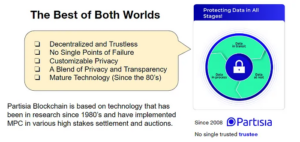
Developers can pick and choose which part of the data in the blockchain needs to be private and which can be public. All thanks to the Partisia Blockchain’s programmable MPC. A layer of governance can be enabled around the private data to allow for computation and access to select individuals. Those who access the data can also be audited transparently.
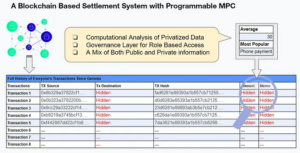
Now, even if someone has your credit card details, they will not be able to see your purchase history and your spending. If needed, a governance model can be created to ensure auditability and traceability to the system.
The importance is evident in our partnership with the International Committee of the Red Cross (ICRC). We partnered with the ICRC to build out a program for distributing aid through blockchain. One of their key requirements was privacy of the aid recipients. As they are a very unique organization, one of their key principles is in confidentiality and bilateral dialogue. The ICRC mainly operates in conflict zones and lack of privacy can mean life or death.
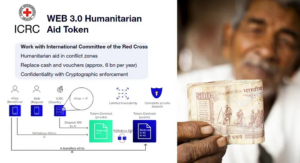
ICRC was able to solve their key challenge of privatizing the transactions of the stable tokens in the ecosystem thanks to Partisia Blockchain’s MPC. As shown above, the deposit of the funds from ICRC is kept private. As a result, transfers between the users are anonymous. To learn more, please watch our video of the overview of the solution here.
As blockchains become more prevalent, the need for privacy will continue to grow and take center stage. Various projects are already being built with private settlements in mind. We continue to speak with many organizations who prioritize the need for privacy in a blockchain solution.
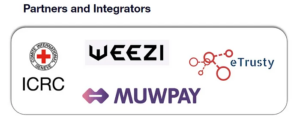
For additional insights on this use case, come and watch our Q&A session we did on this topic.
By creating a programming language that allows for developers to use MPC in a generic way, Partisia Blockchain Foundation has made the creation of applications that can harness the power of MPC for different use cases a possibility. Partisia has been at the forefront of providing private MPC solutions since 2008. And by layering this technology on top of an interoperable and scalable blockchain, Partisia Blockchain is now paving the way for anyone to create solutions that can balance privacy and transparency to build trust.
To learn more about different use cases or partner with us for solutions, please visit partisiablockchain.com, check out our Medium articles, development documentations or email me at bruce.ahn@partisiablockchain.com.
In a traditional asset trading platform, front running is defined as the illegal practice of placing a trade based on advanced non-public knowledge of an upcoming trade which can impact prices. As shown in the example below, a broker can take advantage of a situation when he or she gets a large order by one of their clients. Since they know this order will impact the price of the asset, they place their own personal order ahead of their client’s order. Then, they place the client order, raising the stock price. Once this is done they will sell their own shares to profit off their clients order.
Another term used often is insider trading, which is based on a very similar practice of using information only they have access to in order to gain an unfair advantage over others.
In the Web3 space, everything is transparent and, ironically, revealing too much information can also create these situations. An example of this is front running on a decentralized exchange (dex) that you may have already heard of. This type of a front running is possible through the combination of having total transparency in the blockchain along with how Ethereum (and many other blockchains) prioritize transactions in a node’s mempool.
In this particular example, an attacker (usually a bot) scans the mempool to see a particular scenario that they can take advantage of. Scanning the mempool, they look for an opportunity to insert in a bid at a lower price but higher gas than another large bid already in the mempool.
Once their bid completes, they wait for the larger order to go through, raising the price of the asset. Then they place a sell order at a higher price than the buy order he placed ahead of the larger order, and pockets the difference. All this is happening in a blink of an eye, making it impossible for any normal person to be able to recognize they are being taken advantage of.
But what if we could make the orders private? This prevents the attacker from being able to read the auction details in the mempool, and making the bot unable to identify a situation to take advantage of.
Through multiparty computation (MPC), details can be kept private while still computing the winner. In the situation of this dex, the results of the prices are not revealed until the bids are completed, ensuring that attackers cannot gain any advantageous information ahead of time.
The team in Partisia has already provided solutions to solve this issue in multiple scenarios. From governments to OTC trading platforms, they have been trusted to run high stakes auctions in different levels and through enabling this technology on a blockchain, we are giving everyone the power to solve the problem of ensuring integrity in the bidding process.
For additional insights on this use case, we recommend viewing our Q&A session on this topic.
By creating a programming language that allows for developers to use MPC in a generic way, Partisia Blockchain Foundation has made the creation of applications that can harness the power of MPC for different use cases a possibility. Partisia has been at the forefront of providing private MPC solutions since 2008. And by layering this technology on top of an interoperable and scalable blockchain, Partisia Blockchain is now paving the way for anyone to create solutions that can balance privacy and transparency to build trust.
To learn more about different use cases or partner with us for solutions, please visit partisiablockchain.com, check out our Medium articles, development documentations or email me at bruce.ahn@partisiablockchain.com